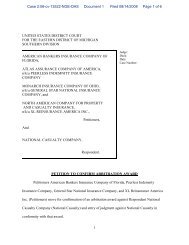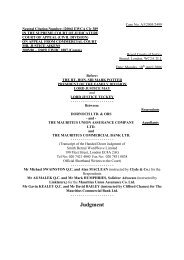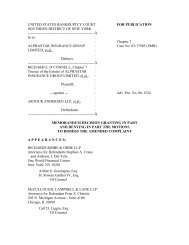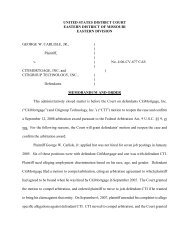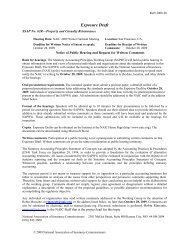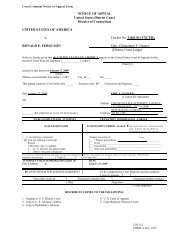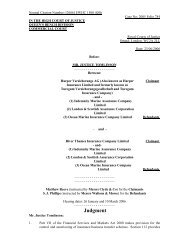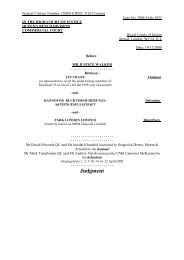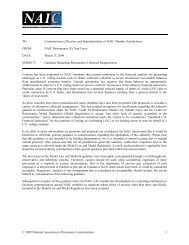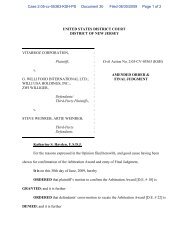Judgment - Reinsurance Focus
Judgment - Reinsurance Focus
Judgment - Reinsurance Focus
You also want an ePaper? Increase the reach of your titles
YUMPU automatically turns print PDFs into web optimized ePapers that Google loves.
In principle I think Mr. Flaux's submission is correct. In Lonsdale & Thompson Ltd v Black<br />
Arrow Group Plc [1993] Ch. 361 Mr. Jonathan Sumption Q.C. sitting as a Deputy<br />
High Court Judge considered the position which arises when property is insured for<br />
its full value by a person whose interest in it is limited. In that case the defendant,<br />
who owned a warehouse in Liverpool, let the building to the plaintiff for 25 years.<br />
The landlord undertook to insure the building for the full reinstatement value and in<br />
the case of its destruction to lay out the proceeds of insurance in reinstating it. The<br />
deputy judge described the position in the following way at page 368-371:<br />
“Insurances on property are prima facie to be construed as<br />
contracts of indemnity. Subject to the express terms of the<br />
policy the measure of the indemnity is the diminution in the<br />
value of the thing insured as a result of the operation of the<br />
insured peril. . . . . .<br />
If the assured has only a limited interest in the property,<br />
being, for example, a tenant or reversioner, a trustee, a<br />
mortgagee or a bailee, the value of his own interest may have<br />
diminished by much less than the value of the property or the<br />
cost of its reinstatement. But it does not necessarily follow that<br />
if the assured recovers the whole diminution in the value of the<br />
property or the whole cost of reinstatement he will be getting<br />
more than an indemnity. That must depend on what his legal<br />
obligations are as to the use of the insurance proceeds when he<br />
has got them. If he is accountable for the proceeds to the<br />
owners of the other interests, then he will not be receiving more<br />
than an indemnity if the insurer pays the full amount for which<br />
the property was insured. This will be so, whether the assured<br />
is accountable to the owners of the other interests as a trustee of<br />
the proceeds of the insurance or simply on the basis that he<br />
owes them a contractual obligation to pay those proceeds over<br />
to them or to employ them in reinstatement. None of this means<br />
that a party with a limited interest who insures the entire<br />
interest in the property is insuring on behalf of the others as<br />
well as for himself. All that it means is that his obligations as to<br />
the use of the insurance moneys once they have been paid are<br />
relevant in determining whether he will recover more than an<br />
indemnity by getting the measure of loss provided for in that<br />
policy.”<br />
48.<br />
Then, after having referred to Waters v Monarch Fire and Life Assurance Co. (1856) 5 El. &<br />
Bs 870, London and North Western Railway Company v Glyn (1859) 1 El & El. 652<br />
and the speech of Lord Reid in A. Tomlinson (Hauliers) Ltd v Hepburn [1966] A.C.<br />
451, 467-468 he continued:<br />
“It is true that a bailee has a rather special status in English law,<br />
having in many respects the rights of an owner as against third<br />
parties. But the decisions in the Waters, Glyn and Tomlinson


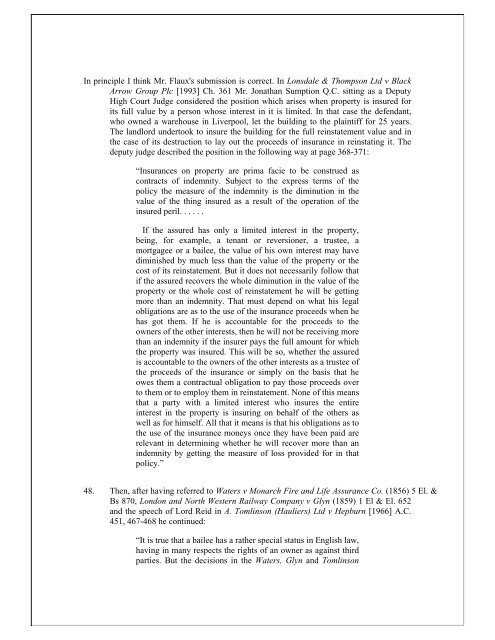
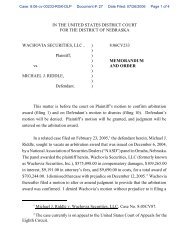
![202 Folio No 734 Neutral Citation Number: [2006] EWHC 1345 (QB ...](https://img.yumpu.com/50015000/1/184x260/202-folio-no-734-neutral-citation-number-2006-ewhc-1345-qb-.jpg?quality=85)
